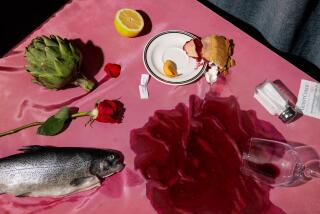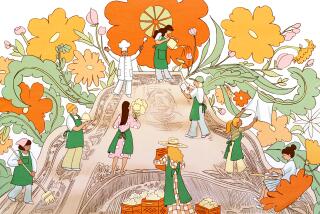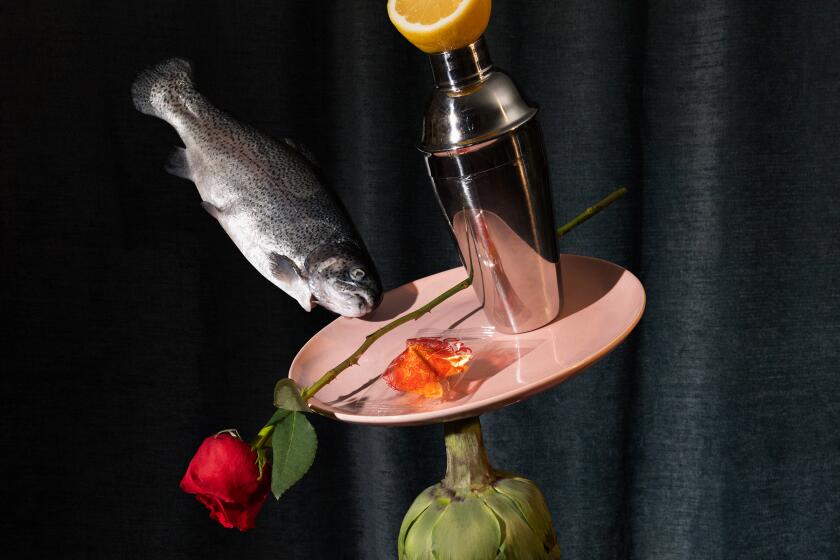FOOD FIGHT! : A Critic Takes Off the Gloves and Takes On His Colleagues
“Can I have a glass of water?” asked restaurant critic John Mariani at the International Food Media Conference in New York a couple of weeks ago. He quickly added, “No, I’m not going to throw it in Jay’s face.”
So began what might, under better circumstances, have turned into this country’s first serious debate about restaurant criticism. Jay Jacobs, former New York restaurant critic for Gourmet magazine, was on a panel with Mariani, critic for Esquire, Playboy and other publications. “There are lots of issues worth addressing,” Mariani said later. I agree; criticism is an uncomfortable craft and I grapple with ethical issues every week. But while this particular debate touched on everything from the impossibility of anonymity to critics who take bribes, for the most part it degenerated into what Mariani himself called “a dog fight that does nothing to raise the standards of reviewing.”
It all began with an article in Gastronome, a small magazine read by affluent foodies. Jacobs, who has recently been replaced as Gourmet’s New York restaurant critic, was asked to assess his colleagues. In the article, Jacobs raised questions about his colleagues’ accuracy, grammar, knowledge of gastronomy and ethics. But his tone, which even his editors labeled “self-indulgent,” was clearly meant to titillate. This is how it started off: “New York’s restaurant reviewers make a nest pit of vipers look like a basketful of pussycats.”
Jacobs, who held his own critical post for 15 years, focused his primary criticisms on the grammar of his colleagues; he romped through their reviews finding hilarious mistakes. One critic “informs his readers . . . that restaurant personnel put their clothes on in populated dining rooms”; another has “dark wood beams comporting themselves with enthusiasm and largess,” and a third finds “dining rooms savoring lamb shoulders with sweet potatoes.” While this sort of stuff is fun, I doubt that there is a writer in the world, Jacobs included, who is immune to criticism of this kind.
He didn’t think much of his colleagues’ style, either. One critic, he wrote, “mistakes dreary recitals of his career statistics for the art of the raconteur”; a second writes “overheated exclamatory gush,” and John Mariani “translates his gleanings into something like a foreign language.”
Jacobs also worried that one “journalist of considerable influence managed to goof as often as he did on matters of simple fact.” This sounds serious, but it then turned out that Jacobs was worrying about confusing shrimp with scampi, cuttlefish with squid and “misrepresenting a flat plate as a bowl.”
He did make some important points, however, as when he attacked one critic for her “gratuitous assaults on obscure mom-and-pop ventures.” The failure of another to adequately update an annual restaurant guide, he wrote, “borders on outright neglect.” A case in point: At one establishment included in the 1986 edition of his book, the critic found one of the restaurant’s partners in the dining room. Commented Jacobs: “Readers might think twice about joining her there; the partner in question happens to have been dead since early 1984.”
Taken all in all, this was pretty tame stuff. Jacobs’ article was fun to read, but since none of the critics deigned to reply, it might well have been forgotten had Jacobs not joined Mariani at the food conference.
“We asked Jacobs to talk about how critics work,” says conference organizer Bill Primavera. “Little did I know that he would decide to talk about all the things that had been taken out of his article!”
Jacobs, in fact, began his speech by noting that his piece had been “expurgated by the editors on the advice of legal counsel; it seems I wasn’t medically qualified to diagnose one reviewer’s condition as brain death. Or legally qualified to charge another with plagiarism or a third with fraud.”
And then, taking off the gloves, Jacobs got down to the real nitty-gritty. “I think,” said Jacobs, “that the public deserves far more professionalism, far more ethicality, far more reliable information and far more craftsmanship than it’s getting.” Carefully using no specific names, he accused his colleagues of graft, intrigue and total irresponsibility.
These are serious charges, and it is a pity that Jacobs chose to use the same tone he had used in his article. In his accusation about infighting in the profession, he said: “A few years back, the influential illiterate I’ll call Mitzi Hepplewhite had only to award three stars . . . to ensure that an arch rival would demolish the place at the earliest opportunity.” I don’t know if this is true, but if it is, it is unfair to restaurateurs and certainly worthy of more considered discussion.
Jacobs’ most serious charge was that “one former reviewer’s spouse not only functioned as bagman when payoffs were collected, but demanded the sexual favors of at least one busboy as a precondition for editorial coverage.” How former is the reviewer, one wonders, and is this sort of thing still going on? Jacobs made veiled references to “chronic freeloading,” and spoke of a critic who “took a tumble or two in the hay with a chef whose work she was about to review.” He accused an unnamed editor of “commanding her reviewers to shed favorable ink on behalf of restaurants either owned by people who have curried her favor or repped by a PR woman with whom she maintains far too chummy a relationship.” Another writer, he said, “steadfastly refrains from finding any fault whatsoever with any place that advertises in any of the rags he has scribbled for.” Finally, he accused one participant in the conference of “regularly regaling himself at big-ticket restaurants in the confident expectation that no check will be presented.”
Restaurant criticism is a relatively new field, but the time has clearly come for a debate about issues such as these. These practices are unfair both to the people who eat in restaurants and to the people who own them. Unfortunately, Jacobs’ tone was inflammatory and Mariani rose to respond in kind. “Jay Jacobs,” he began, “of all people, should know better than to throw stones at colleagues who could easily bury him. . . .”
Mariani later regretted his outburst of temper. “It’s real unfortunate,” he said, “It should never have happened.” For their part, his colleagues have been remarkably discreet. Gael Green said she had not read Jacobs’ words and didn’t intend to. The New York Times’ Bryan Miller said, “My decision is just not to say anything about it.”
But many of the issues Jacobs and Mariani raised are worth talking about. It’s too bad that this particular debate ended up as a food fight filled with little more than hot air.
More to Read
Eat your way across L.A.
Get our weekly Tasting Notes newsletter for reviews, news and more.
You may occasionally receive promotional content from the Los Angeles Times.






